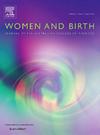“Where’s my baby?” A feminist phenomenological study of women experiencing preventable separation from their baby at caesarean birth
IF 4.1
2区 医学
Q1 NURSING
引用次数: 0
Abstract
Problem
Separating women and babies immediately after birth contributes to poor birth experience and reduced satisfaction.
Background
A negative birth experience can impact a woman’s transition to motherhood and emotional well-being beyond the newborn period. Separating women from their baby at birth is known to reduce birth satisfaction and is more likely to happen at caesarean section births.
Question
What is the experience of women who are separated from their baby after caesarean section birth without medical necessity?
Methods
Unstructured, in-depth phenomenological interviews were conducted with fifteen women who had been separated from their well-baby at caesarean section birth. Data was analysed using a Modified van Kaam approach. A novel feminist phenomenological framework with two birthing theories was used to explore the experience of the participants.
Findings
Four major themes emerged – Disconnection, Emotional Turmoil, Influence, and Insight. These demonstrated significant trauma that both the separation and perinatal care created.
Discussion
The participants recognised their vulnerability and the lack of power and control they had over themselves and their baby, which was seemingly not acknowledged. Provider and hospital needs were valued above those of the women.
Conclusion
Woman-centred care was not evident in the treatment of these women despite the attendance of a midwife at each birth. This research challenges midwives and other health care providers to support and advocate for those birthing by caesarean section to return power and control and support them to remain in close physical contact with their baby immediately after birth.
"我的宝宝在哪里?一项女性主义现象学研究,研究剖腹产产妇与婴儿分离的可预防情况。
问题:分娩后立即将产妇和婴儿分开会导致不良的分娩体验和满意度降低:负面的分娩经历会影响妇女向母亲的过渡以及新生儿期之后的情绪稳定。众所周知,妇女在分娩时与婴儿分离会降低分娩满意度,而且更有可能发生在剖腹产中:问题:在没有医疗必要的情况下,剖腹产后与婴儿分离的妇女会有怎样的经历?对 15 名在剖腹产时与婴儿分离的妇女进行了非结构化、深入的现象学访谈。采用改良范卡姆方法对数据进行分析。研究采用了新颖的女权主义现象学框架和两种分娩理论来探讨参与者的经历:出现了四大主题--断裂、情绪波动、影响和洞察力。这些主题显示了分离和围产期护理所造成的巨大创伤:讨论:参与者认识到自己的脆弱性,以及她们对自己和婴儿缺乏权力和控制,而这一点似乎没有得到承认。提供者和医院的需求高于产妇的需求:结论:尽管每次分娩都有助产士在场,但在这些产妇的治疗过程中,以妇女为中心的护理并不明显。这项研究对助产士和其他医疗服务提供者提出了挑战,要求他们支持和倡导剖腹产产妇重新获得权力和控制权,并支持她们在分娩后立即与婴儿保持密切的身体接触。
本文章由计算机程序翻译,如有差异,请以英文原文为准。
求助全文
约1分钟内获得全文
求助全文
来源期刊

Women and Birth
NURSING-OBSTETRICS & GYNECOLOGY
CiteScore
7.20
自引率
13.20%
发文量
371
审稿时长
27 days
期刊介绍:
Women and Birth is the official journal of the Australian College of Midwives (ACM). It is a midwifery journal that publishes on all matters that affect women and birth, from pre-conceptual counselling, through pregnancy, birth, and the first six weeks postnatal. All papers accepted will draw from and contribute to the relevant contemporary research, policy and/or theoretical literature. We seek research papers, quality assurances papers (with ethical approval) discussion papers, clinical practice papers, case studies and original literature reviews.
Our women-centred focus is inclusive of the family, fetus and newborn, both well and sick, and covers both healthy and complex pregnancies and births. The journal seeks papers that take a woman-centred focus on maternity services, epidemiology, primary health care, reproductive psycho/physiology, midwifery practice, theory, research, education, management and leadership. We also seek relevant papers on maternal mental health and neonatal well-being, natural and complementary therapies, local, national and international policy, management, politics, economics and societal and cultural issues as they affect childbearing women and their families. Topics may include, where appropriate, neonatal care, child and family health, women’s health, related to pregnancy, birth and the postpartum, including lactation. Interprofessional papers relevant to midwifery are welcome. Articles are double blind peer-reviewed, primarily by experts in the field of the submitted work.
 求助内容:
求助内容: 应助结果提醒方式:
应助结果提醒方式:


